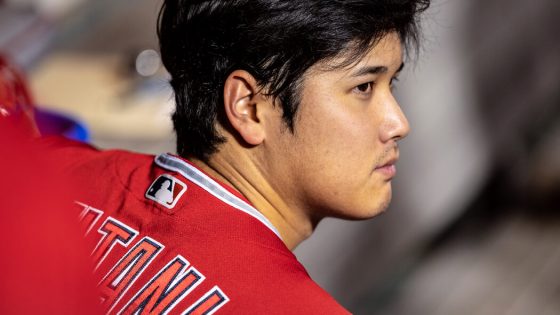In the clubhouse after the Los Angeles Dodgers won their season opener in Seoul last month, Shohei Ohtani’s longtime interpreter, Ippei Mizuhara, made a stunning admission to the team: He was a gambling addict, and Ohtani had paid his debts to a bookmaker.
Ohtani, who is not fluent in English, listened but failed to fully grasp what Mizuhara said. He knew enough to grow suspicious, however, and he wanted answers.
A couple of hours later, around midnight, Ohtani finally had the chance to pull Mizuhara into a conference room in the basement of the Fairmont Ambassador Hotel in Seoul.
With just the two of them there, Mizuhara leveled with his boss: He had accrued enormous debts to the bookmaker and had been stealing the baseball star’s money to pay them off.
In coming clean, though, Mizuhara made one last effort to protect himself from the law, according to two people familiar with the conversation, who asked for anonymity to discuss a private matter. He asked his patron to go along with the story that he had just told Ohtani’s teammates, his advisers and a reporter for ESPN who had made inquires about $4.5 million in wire transfers from Ohtani’s account to an illegal bookmaker in California.
Ohtani refused and called his agent, Nez Balelo, into the conference room. Balelo then had several other people dial in as they managed the crisis: a lawyer in Los Angeles; Matthew Hiltzik, a crisis communications executive in New York; and a new interpreter whom Ohtani’s inner circle could trust. Mizuhara’s wife also joined the meeting.
Shortly after, Ohtani’s advisers issued a statement to reporters, alleging that Ohtani was the victim of a multimillion-dollar theft. Soon headlines connecting Ohtani to illegal gambling spread around the world.
It was a story that would set off a dizzying three weeks, moving from South Korea to Los Angeles, from ballparks to hotels to airports, to meetings with lawyers and federal agents. At times, it seemed that baseball’s biggest star was in danger of being tainted by a gambling scandal, echoing painful episodes from the sport’s past. It culminated on Thursday when prosecutors charged Mizuhara with bank fraud and released a criminal complaint alleging a lavish embezzlement in which he stole $16 million from Ohtani, whom they firmly stated was the victim in the case.
The formal charge and complaint were announced a day after The New York Times reported that Mizuhara and his lawyer, Michael Freedman, a former prosecutor who specializes in white-collar criminal defense, were negotiating a plea deal. On Friday, Mizuhara surrendered to law enforcement in Los Angeles and made an initial court appearance, wearing street clothes and shackles. He did not enter a plea, and was released on a $25,000 bond. The conditions of his release require him to submit to drug testing and seek treatment for a gambling addiction.
Freedman issued a statement on Friday saying Mizuhara “is continuing to cooperate with the legal process and is hopeful that he can reach an agreement with the government to resolve this case as quickly as possible so that he can take responsibility.” He added that Mizuhara apologized to Ohtani and the Dodgers and was “eager to seek treatment for his gambling.”
The trip to Seoul seemed like a triumphant moment for Major League Baseball. Ohtani’s emergence as a transcendent star in the United States, one whose on-field exploits evoked comparisons to Babe Ruth, had given the league fresh cultural relevance around the world. And now Ohtani and his new team, which signed him to a 10-year, $700 million contract in December, were in Asia to open a new season with two games against the San Diego Padres. Excitement could not have been higher.
But once the Mizuhara news broke, Major League Baseball realized it had a problem on its hands. It announced that it was investigating the matter. And the Los Angeles field offices of the Internal Revenue Service’s criminal division and the Department of Homeland Security uncharacteristically went public with news that they, too, had opened an inquiry. The saga of Pete Rose, the major leagues’ career hits leader, who was barred from baseball in the 1980s for betting on the sport, was on everyone’s mind.
After the meeting at the hotel, the Dodgers promptly fired Mizuhara. He was soon on a plane back to Los Angeles, where homeland security agents met him at the airport. He refused to submit to an interview, but he gave the agents access to a gold mine of information that would prove crucial to their investigation: He signed a form giving his consent to search his cellphone.
Ohtani also flew back to Los Angeles under a cloud. When he arrived, he gave investigators access to his electronic devices, too.
Working with a Japanese linguist, investigators pored over about 9,700 pages of text messages between the two men and found no mentions of sports betting or any of the bookmakers Mizuhara had been dealing with.
Over two days this month, Ohtani met with investigators in Los Angeles — on one of the days he hit his first home run as a Dodger, hours after an interview with the agents — and described his relationship with Mizuhara, whom he first met in 2013 while playing professional baseball in Japan.
The Los Angeles Angels hired Mizuhara as Ohtani’s translator when Ohtani joined the team in 2018. But Ohtani also separately employed him as a “de facto manager and assistant,” according to the complaint. Mizuhara drove his boss to and from the ballpark and managed certain “business and personal matters” outside baseball.
In 2018, both men visited a bank in Arizona, where the Angels held spring training, and opened an account into which Ohtani’s paychecks could be deposited. For the next three years, Ohtani never once logged into the account online, according to prosecutors, and the money piled up.
Ohtani has many other accounts, of course — he earns more money from endorsements and business deals than he does from his lucrative baseball salary. But it was this account, solely for Ohtani’s baseball earnings, that Mizuhara would scheme to take control of and then, as he fell deeper into a gambling addiction, pilfer for years, according to prosecutors.
Mizuhara changed the settings of the account so alerts and confirmations of transactions would go to him, not Ohtani. Drawing on phone recordings obtained from the bank, prosecutors said Mizuhara had also impersonated Ohtani to gain the bank’s approval for certain large transactions. And whenever one of Ohtani’s other advisers — his agent, tax preparer, bookkeeper or financial adviser, all of whom were interviewed for the federal investigation — inquired about the account, Mizuhara told them that Ohtani preferred the account to remain private.
Between November 2021 and January this year, Mizuhara stole $16 million from the account to feed his “voracious appetite for sports betting,” according to E. Martin Estrada, the U.S. attorney in Los Angeles.
Ohtani has been called many things over the past few years. The modern-day Ruth. A baseball monk. Japan’s most famous citizen. In the criminal complaint that the authorities released on Thursday he was identified simply as “Victim A.”
The complaint revealed text messages between Mizuhara and the bookmaker, who is also the subject of a federal investigation, as Mizuhara racked up losses and was repeatedly given increases to his credit limit — “bumps,” in the parlance of gamblers.
A text from Mizuhara in 2022 reads: “I’m terrible at this sport betting thing huh? Lol … Any chance u can bump me again?? As you know, you don’t have to worry about me not paying.”
While there is no evidence that Ohtani knew about the betting, the bookmaker knew of Mizuhara’s connection to Ohtani. Last November, the bookie was having trouble reaching Mizuhara and threatened to expose him to Ohtani, saying he knew where to find the baseball star.
In a text included in the complaint, the bookmaker wrote: “Hey Ippei, it’s 2 o’clock on Friday. I don’t know why you’re not returning my calls. I’m here in Newport Beach and I see [Victim A] walking his dog. I’m just gonna go up and talk to him and ask how I can get in touch with you since you’re not responding? Please call me back immediately.”
As Mizuhara fell deeper into debt, prosecutors say, he used $325,000 of Ohtani’s money at the beginning of this year to buy baseball cards online and had them shipped to the Dodgers clubhouse under a pseudonym. Agents found the cards — of Juan Soto, Yogi Berra and Ohtani, among others — in several briefcases when they searched Mizuhara’s car. Prosecutors said they believed he had planned to resell them.
This being a baseball story, the criminal complaint was stuffed with numbers:
-
19,000 bets.
-
$142,256,769.74 total winning bets.
-
$182,935,206.58 total losing bets.
Crucially, for Ohtani and for Major League Baseball, prosecutors said none of Mizuhara’s bets had been on baseball.
When news of the story broke in South Korea, Major League Baseball was alarmed by the shifting narratives, two people familiar with the matter said, and worried that Ohtani could somehow be entangled in a gambling scandal that had the potential to tarnish the entire sport.
Those worries dissipated a week later when Ohtani offered a detailed account to reporters at Dodger Stadium, saying Mizuhara stole from him and pledging to cooperate with any investigations. Baseball officials were doubtful, the people said, that Ohtani would make up such a story knowing that both the federal authorities and the league would investigate it. When the authorities charged Mizuhara and detailed the allegations against him, any remaining suspicions were cleared.
As for the Dodgers, they are leading their division early in a season that many fans will declare a failure if it does not end with a championship. Ohtani’s bat is heating up. Inside the clubhouse, players say Ohtani, without Mizuhara as a buffer, has made more of an effort to get to know his teammates.
“You know, the last couple of days, I think Shohei has been even more engaging with his teammates,” Dave Roberts, the Dodgers’ manager, told reporters after Ohtani addressed the matter for the news media in Los Angeles two weeks ago. “And I think there’s only upside with that.”
Ana Facio-Krajcer contributed reporting.
Source Agencies




